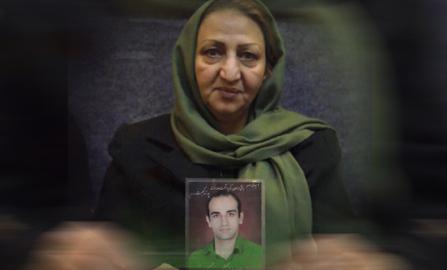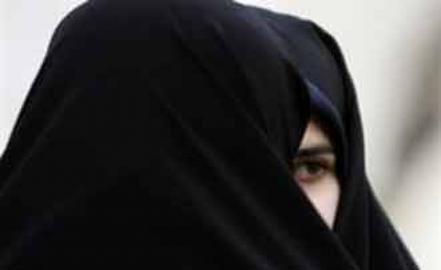Shahnaz Akmali’s son, Mostafa Karim Beigi, was shot dead in December 2009 during street protests that followed the disputed presidential election. Since then, Akmali has called for authorities to tell the truth about what happened to her son, and devoted herself to the families of other victims killed in 2009. And now she is being punished for it.
On October 29, Radio Farda reported that a Revolutionary Court had sentenced Akmali on charges of “propaganda against the regime” [Persian link]. As punishment, she faces a year in prison and is banned from traveling abroad, from using social networks and from any political activity.
On January 2017, intelligence officials raided Akmali’s workplace and her house in Tehran and confiscated some of her belongings before arresting her. She spent three weeks at the Intelligence Ministry’s Ward 209 at Evin Prison, including 17 days in solitary confinement, and was interrogated without the presence of a lawyer. Authorities released her on February 18 after she paid a bail of 100 million romans — close to $29,000.
After the lower Revolutionary Court published its verdict, many Iranians went on to Twitter using the hashtag #MostafaMom to show their support. “Grieving mother put in a cage...to silence her,” tweeted one person. “This is abuse like no other. How dare any man silence a mother.”
From the beginning, as soon as her 26-year-old son Mostafa was killed, Shahnaz Akmali refused to accept the official version of what happened. Following the demonstration at which Mostafa died, officials claimed he had fallen to his death from a bridge. But not only was Akmali’s version of the story different, eyewitnesses confirmed her account [Persian link]. “Mostafa was shot...,” she said. “Unfortunately, some people think he fell from the bridge. No...They shot him with a bullet to the left side of his forehead. The back of Mostafa’s head was gone.”
But now, ironically, at least one section of the Islamic Republic’s regime — the judiciary — confirms her story. “Her son was shot dead during the [2009] Sedition in the course of street protests,” the indictment against Shahnaz Akmali reads. “The Sedition” is the term Iranian officials use when referring to the events of 2009, which is known as the Green Movement by those who took part in the protest, and those who supported their right to protest.
Shut Up or Else!
Over the last eight years, the family of Karim Beigi has been under constant pressure from authorities. As with the families of other victims of 2009, they have been threatened with a ban on burying their children in Tehran and from holding mourning services. But, despite threats, Akmali has stood her ground and has tried to be the voice of other families as well. “Kill me too, kill my daughter, but I will not keep quiet and will follow my son’s path,” she said in a video aired on Voice of America’s Persian service shortly after her arrest.
Akmali said authorities had threatened to kill her daughter if she did not stop advocating for the plight of other families: “They called me again and said: ‘We will kill your daughter the same way we’ve killed your son, so shut up. Stay home and just recite the Koran for your son. We will kill you and your daughter if you leave home.’”
Another part of Akmali’s indictment refers to her activities on behalf of other families and in support of human rights: “After the son of the accused was killed when the country was in crisis, Ms. Akmali and her daughter came to the attention of the opportunist counter-revolutionary movements inside and outside Iran and became tools in illegal activities and agitation against the state.”
The indictment also cites Akmali's connections with human rights activists including academic and pro-democracy activist Mohammad Maleki, human rights lawyer Nasrin Sotoudeh and Hassan Nayeb Hashem, a human rights activist and a member of the Human Rights Council in Geneva, as evidence of her intentions to harm the Islamic Republic.
Shahnaz Akmali helped narrate the documentary “2009” (video in Persian) made by journalist and women’s rights activist Masih Alinejad. In the film, Akmali visits and talks to the families of other victims from the 2009 crackdown. She has also been accused of receiving money from “anti-revolutionary” sources to distribute among the families of political prisoners.
And there are other accusations: Interviews with foreign media, setting up a Telegram Channel for sharing information about the condition of political prisoners and prisoners of conscience, and being a member of groups of mothers whose children have perished at the hands of Islamic Republic security forces.
Prior to the authorities’ ban on her using social networking sites, Akmali regularly posted about her activities on Twitter and Instagram. According to an informed source, the examining magistrate had urged her to stop all activities related to her son, online and off. But the same source also said Akmali refused to comply and so was sentenced to one year in prison. She was given 20 days to appeal the verdict.
“While I am alive,” she said on Instagram, “I will remain the voice of my wronged son.”
visit the accountability section
In this section of Iran Wire, you can contact the officials and launch your campaign for various problems


























comments